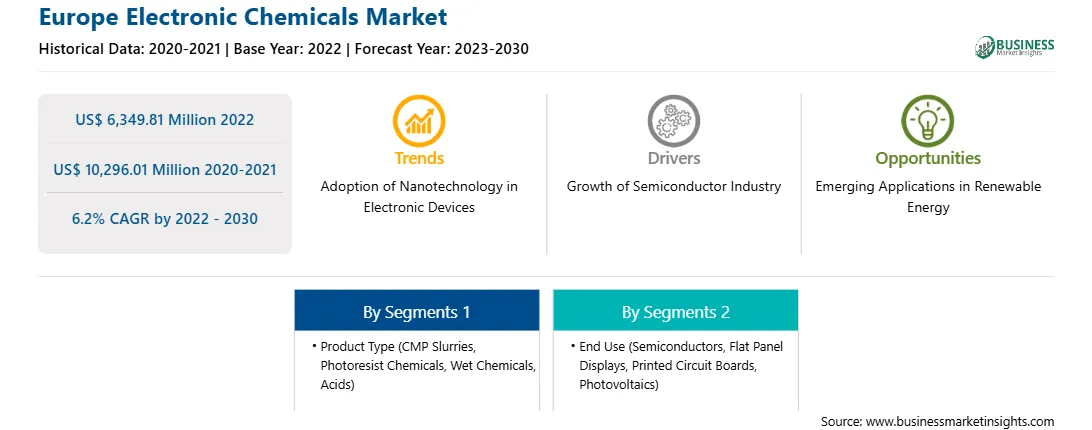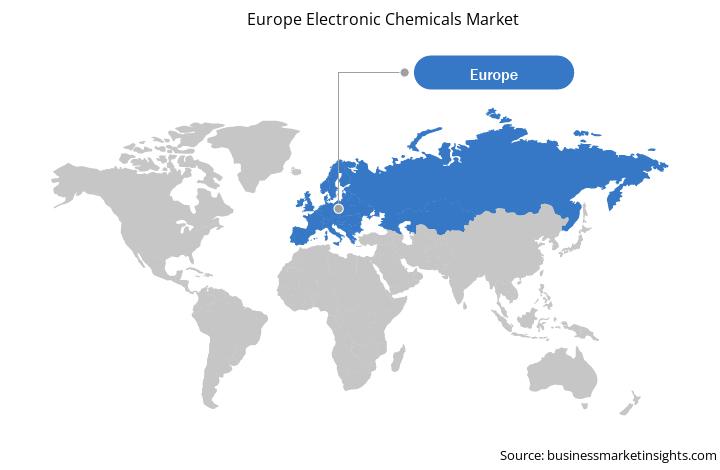Europe Electronic Chemicals Market
No. of Pages: 118 | Report Code: BMIRE00030742 | Category: Chemicals and Materials
No. of Pages: 118 | Report Code: BMIRE00030742 | Category: Chemicals and Materials
The Europe electronic chemicals market was valued at US$ 6,349.81 million in 2022 and is expected to reach US$ 10,296.01 million by 2030; it is estimated to register a CAGR of 6.2% from 2022 to 2030.
Flat-panel displays such as liquid crystal displays, organic light-emitting diode displays, and microLED displays require sophisticated manufacturing processes that rely on electronic chemicals. These chemicals are used for cleaning, patterning, coating, encapsulation, and surface treatment steps to fabricate various layers and components of flat-panel displays. Cleaning agents such as solvents, surfactants, and etchants are used to remove contaminants, particles, and residues from glass substrates and semiconductor layers. The increasing adoption of smartphones, tablets, televisions, digital signage, and automotive displays has fueled the demand for flat-panel displays. The demand for high-definition television and computer monitors with large screen sizes and high resolution is rising. The automotive industry is integrating flat-panel displays into vehicle dashboards, infotainment systems, instrument clusters, and rear-seat entertainment systems. Automotive displays provide navigation information and connectivity features that cater to consumer preferences for in-car technology. According to a European Automobile Manufacturers’ Association (ACEA) report, global motor vehicle production reached 79.1 million units, including 61.6 million passenger cars, in 2021. It reported a growth of 1.3% from 2020 to 2021.
Therefore, the rising demand for flat-panel displays is driving the demand for electronic chemicals.
Europe Electronic Chemicals Market Overview
Europe is growing with a fast-changing semiconductor marketplace as governments worldwide increasingly adopt more restrictive policies on importing and using chips from overseas. The European Commission passed the EU Chips Act in April 2023 with an aim to double Europe’s share in global chip production by 2030 by mobilizing US$ 47 billion in public and private investment. The plan included the expansion of advanced chip manufacturing technology and R&D facilities. In the semiconductor fabrication process, electronic chemicals are used for cleaning, etching, deposition, and doping of semiconductor materials such as silicon. Electronic chemicals play a major role in semiconductor manufacturing by enabling the precise control of material properties and the fabrication of highly complex integrated circuits. The Austrian government is placing a difference in its competitive legal environment to attract the investment of semiconductor manufacturers in the country. In January 2023, the Austrian government announced the funding of US$ 709.5 million until 2026 for research and business in Austria. From 2023 to 2026, US$ 650.4 million will be made available for the transformation and US$ 59.1 million for semiconductor production. In addition, the country relaunched the "Lab2Fab" program in 2022 with a fund of US$ 15 million. This program is co-financed with funds from the Zukunft Österreich Fund. This funding program is aimed at supporting the Austrian semiconductor industry and related sectors in carrying out multi-year research and development projects and the establishment of the industrial production of semiconductor products. Several European countries have set targets to phase out internal combustion engine vehicles and support the transition toward electric vehicles. Infrastructure developments, including charging stations, majorly focus on supporting the widespread adoption of electric vehicles. According to the International Trade Administration report published in 2022, increased investment in the automotive industry creates lucrative opportunities for automotive components and materials. Turkey marked the presence of 48,000 hybrid and 2,000 electric vehicles on the roads and ~800 vehicle charging stations as of 2022. European automotive electronics manufacturers are focused on enhancing vehicle efficiency, reducing emissions, and improving user experience through innovations. Thus, growth in the region's semiconductor and automotive electronics industries is expected to fuel the demand for electronic chemicals.
Strategic insights for the Europe Electronic Chemicals provides data-driven analysis of the industry landscape, including current trends, key players, and regional nuances. These insights offer actionable recommendations, enabling readers to differentiate themselves from competitors by identifying untapped segments or developing unique value propositions. Leveraging data analytics, these insights help industry players anticipate the market shifts, whether investors, manufacturers, or other stakeholders. A future-oriented perspective is essential, helping stakeholders anticipate market shifts and position themselves for long-term success in this dynamic region. Ultimately, effective strategic insights empower readers to make informed decisions that drive profitability and achieve their business objectives within the market.

| Report Attribute | Details |
|---|---|
| Market size in 2022 | US$ 6,349.81 Million |
| Market Size by 2030 | US$ 10,296.01 Million |
| Global CAGR (2022 - 2030) | 6.2% |
| Historical Data | 2020-2021 |
| Forecast period | 2023-2030 |
| Segments Covered |
By Product Type
|
| Regions and Countries Covered | Europe
|
| Market leaders and key company profiles |
The geographic scope of the Europe Electronic Chemicals refers to the specific areas in which a business operates and competes. Understanding local distinctions, such as diverse consumer preferences (e.g., demand for specific plug types or battery backup durations), varying economic conditions, and regulatory environments, is crucial for tailoring strategies to specific markets. Businesses can expand their reach by identifying underserved areas or adapting their offerings to meet local demands. A clear market focus allows for more effective resource allocation, targeted marketing campaigns, and better positioning against local competitors, ultimately driving growth in those targeted areas.

The Europe electronic chemicals market is segmented into product type, end use, and country.
Based on product type, the Europe electronic chemicals market is categorized into CMP slurries, photoresist chemicals, wet chemicals, acids, and others. The wet chemicals segment held the largest market share in 2022.
In terms of end use, the Europe electronic chemicals market is segmented into semiconductors, flat panel displays, printed circuit boards, photovoltaics, and others. The flat panel displays segment held the largest market share in 2022.
By country, the Europe electronic chemicals market is segmented into Germany, France, Italy, the UK, Russia, and the Rest of Europe. Germany dominated the Europe electronic chemicals market share in 2022.
FUJIFILM Holdings Corp, Songwon Industrial Co Ltd, PVS Chemical Solutions Inc, Hitachi High-Tech Corp, Solvay SA, BASF SE, Linde Plc, and Honeywell International Inc are some of the leading companies operating in the Europe electronic chemicals market.
The Europe Electronic Chemicals Market is valued at US$ 6,349.81 Million in 2022, it is projected to reach US$ 10,296.01 Million by 2030.
As per our report Europe Electronic Chemicals Market, the market size is valued at US$ 6,349.81 Million in 2022, projecting it to reach US$ 10,296.01 Million by 2030. This translates to a CAGR of approximately 6.2% during the forecast period.
The Europe Electronic Chemicals Market report typically cover these key segments-
The historic period, base year, and forecast period can vary slightly depending on the specific market research report. However, for the Europe Electronic Chemicals Market report:
The Europe Electronic Chemicals Market is populated by several key players, each contributing to its growth and innovation. Some of the major players include:
The Europe Electronic Chemicals Market report is valuable for diverse stakeholders, including:
Essentially, anyone involved in or considering involvement in the Europe Electronic Chemicals Market value chain can benefit from the information contained in a comprehensive market report.